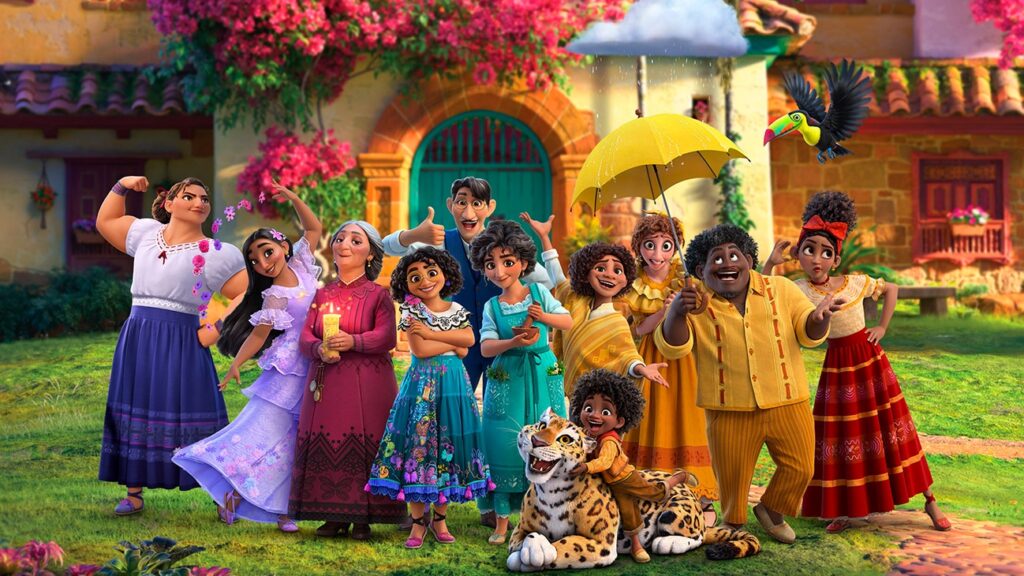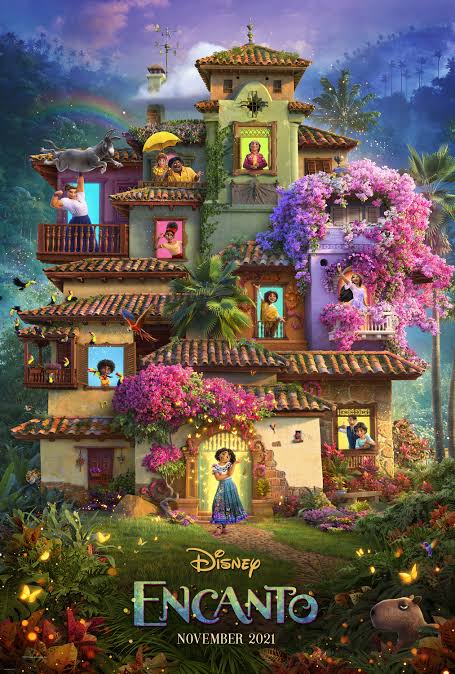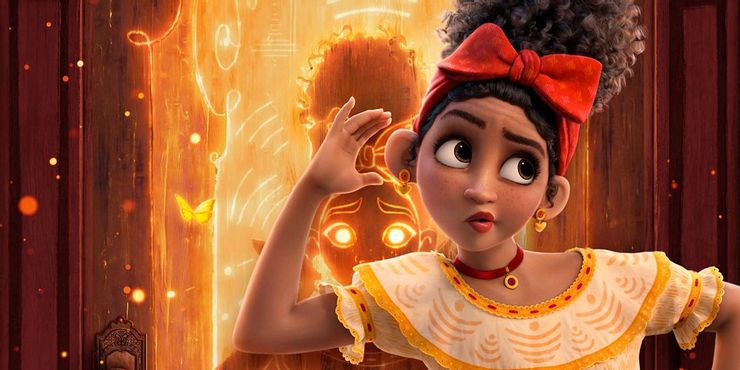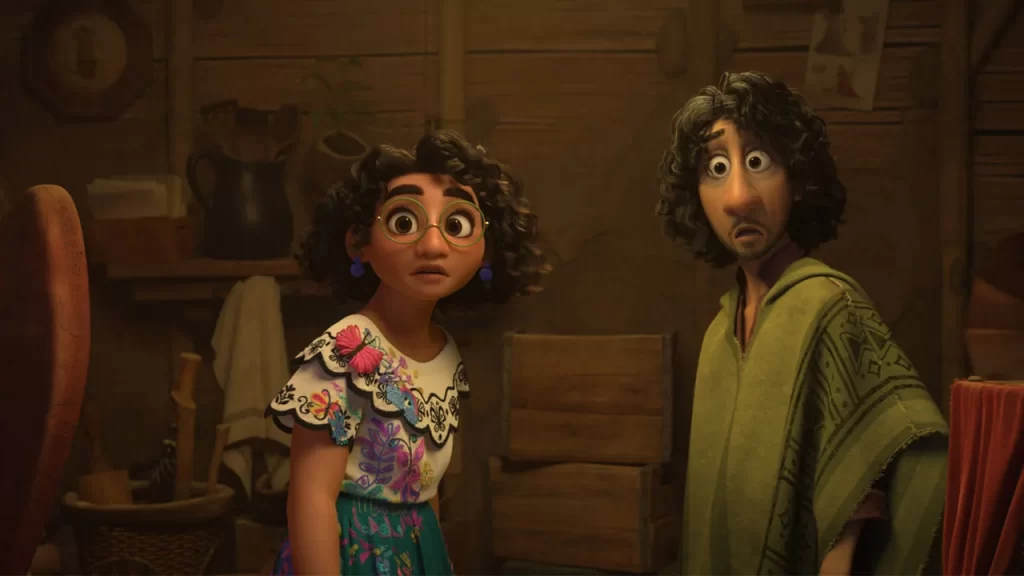We Need to Talk About Encanto
With its latest animated extravaganza, Encanto, Disney weaves its magic to shine a light on inter-generational trauma.
(Contains spoilers)

The latest offering from Walt Disney Animation Studios, Encanto (streaming on Hotstar in India), is a rapturously imagined, gorgeously rendered musical about the fissures within an extraordinarily gifted family. Capturing tiny hearts with its rainbow-lush imagery and catchy, chart-topping soundtrack (songs by Lin-Manuel Miranda of Moana and Hamilton fame), Encanto has also taken over social media with its themes of intergenerational trauma, sibling rivalry and immigrant displacement. Encanto-themed content on TikTok has gone viral and parenting influencers on Instagram have dived deep into the intergenerational trauma so poignantly evoked by the movie. Every social media platform is brimming with posts and comments by users talking about how the movie reduced them to tears, how they related with such-and-such character, and how the soul-stirring, cathartic music plays on repeat in their homes (it certainly does in ours!)
Encanto is the story of the Madrigal family – matriarch Abuela Alma Madrigal, her children and grandchildren – all of whom live in a magical home in a misty Colombian rainforest valley. The Casa Madrigal is a worthy 21st century addition to the lineage of Disney castles, with its ornate tiles, vibrant color palette and enchanted doors and windows (also floors, staircases, furniture and crockery!). And yet, Encanto abandons European fairy magic for the largely Latin American literary tradition of magical realism (think Isabel Allende’s House of Spirits, Gabriel García Márquez’s One Hundred Years of Solitude). The dark backstory of the movie involves Abuela and her husband, Pedro, fleeing political violence shortly after the birth of their triplet babies. Abuelo Pedro martyrs himself in order to save his family and his people, leaving Abuela and the babies alone and adrift. In their “darkest moment”, Abuela recounts, they were granted a miracle: a magical, ever-flaming candle that is the source of their power, an enchanted home to replace the one they have lost, and powerful mountains that rise up to protect their little village.


These superpowers allow the Madrigal family to serve their community. As Abuela says in the opening song of the film:
“We swear to always
Help those around us
And earn the miracle,
That somehow found us
The town keeps growing,
The world keeps turning,
But work and dedication will keep
the miracle burning
And each new generation must keep
the miracle burning”
However, all is not well in the fairy tale world of the Madrigals. Mirabel is the first to notice that the magic is fading. There are cracks in the floors and walls of the house. Her family members are losing their powers. And everyone else seems to be in denial about it! Most notably Abuela, who in fact blames Mirabel for doing “something” that is affecting the magic. Mirabel then takes it upon herself to save their miracle and thus begins the movie’s quest narrative, except, instead of journeying into strange and dangerous lands, our hero dives deeper into family history and uncovers raw wounds.
Eventually, Mirabel discovers the trauma that Abuela still carries within her, that permeates all her relationships and the hearts of all her gifted family members. To save the magic, Mirabel needs to heal the wounds that fester within her family. The vision her fortune-telling uncle shows her gives her a clue: she needs to embrace her sister, Isabella, whom she has a fraught relationship with. The family needs to see each other for who each person truly is and not assign their worth to the service their “gift” can perform.
At the end of the day, this is a Disney film. Abuela sees the light and redeems herself, the family and their neighbours rebuild Casa Madrigal together, the family members’ gifts and the house’s magic are restored and everyone lives happily, magically – albeit a little messily – ever after. But even in this happy ending, there is truth. Intergenerational trauma can end if one generation “breaks the cycle”. Mirabel stands up to Abuela and says: “Luisa will never be strong enough. Isabella will never be perfect enough. You’re the one breaking our home… the miracle is dying because of you.” After visiting the scene of her trauma and understanding the root of the issue, Abuela realizes, “I was so afraid of losing it, that I lost sight of who our miracle was for.” And with that confrontation, the cycle is broken.

One of the reasons this movie has resonated so deeply with immigrants – and particularly Latinx immigrants – is that inter-generational trauma is pervasive where there is a history of political violence and/or displacement. But inter-generational trauma can affect other families too, families that may not have suffered through terrible historic events, but milder forms of abuse or painful family experiences. The way inter-generational trauma works is that each generation, starting from Ancestor X (usually 3 or max 4 generations above us), is unable to escape the pain of their own childhood and buries it deep in their children as well. Over each generation, it usually diminishes just a little but it’s still there – the fear, the judgment, the spectre of failure; the need to be perfect, to “represent the family”. Children and their children learn maladaptive coping styles from their predecessors. This cycle can only be “broken” if one generation (or one/some members of a generation) actively works to break it. By confronting, by talking about it, by undergoing therapy, by healing.
What makes Encanto so powerful (and the huge box office hit and social media sensation it has become) is just how relatable the theme of the toxic family actually is. Cast in a familiar trope of a collective with assorted superpowers (X-Men, The Incredibles, etc), each member of the Madrigal family is actually an archetype – a universally relatable figure – whose gift or superpower is also the source of her/his greatest suffering. Mirabel’s cousin Camilo, the shape-shifter, is “the jester” – the funny one, whose job it is to keep everyone smiling and to hide real feelings under humour. Another cousin, Dolores, who can hear whispers a mile away, is the “listener”. It’s her destiny to hear everyone’s secrets and to absorb them. Mirabel’s mother, Julieta, who can cure ailments with food, is the “healer”, who tries to balm fissures in the family. Her aunt, Pepa, perennially under a dark cloud, whose mood swings cause hurricanes, is the family member struggling with depression.

Lin-Manuel Miranda’s “We Don’t Talk About Bruno”, sung by practically the entire cast of Encanto, dethroned Adele to take the top spot on the Billboard Top 100
Of course, Bruno isn’t the only “special needs” child. This is a family full of “gifted” children, remember? In the real world, “gifted” children, who may have soaring IQs and immense talents in certain arenas, have immense stressors and anxieties of their own. In the movie, this struggle to cope is depicted best in Mirabel’s two sisters. Luisa, the eldest, is “the strong one”. Not only can she easily lift all the donkeys in the Encanto, that “beast of burden” symbolizes the load she carries for her family and for the entire village. Her song, “Surface Pressure” – another total earworm – has spawned a thousand TikToks about the weight that older siblings bear:
“Pressure like a drip, drip, drip that’ll never stop, whoaPressure that’ll tip, tip, tip till you just go pop, whoa-uh-uh
Give it to your sister, it doesn’t hurt and
See if she can handle every family burden
Watch as she buckles and bends but never breaks
No mistakes, just
Pressure like a grip, grip, grip,
And it won’t let go, whoa
Pressure like a tick, tick, tick
Till it’s ready to blow, whoa-uh-uh
Give it to your sister and never wonder
If the same pressure would’ve pulled you under”
Yet, it is her gift of superhuman strength that gives Luisa her sense of worth (“Under the surface, I’m pretty surе I’m worthless is I can’t be of servicе”) and this is where the dichotomy lies.
Isabella, Mirabel’s other sister, is the “golden child”, perfect in every way. She can make flowers bloom, is set to marry the town hunk and seems destined to achieve every happiness. Mirabel unwittingly ruins Isabella’s betrothal night and, in a confrontation that ensues, Isabella breaks down (and breaks into song) to reveal her true self: “I’m so sick of pretty, I want something true, don’t you? What else can I do?”
It is impossible not to see oneself in one or many of the characters of Encanto, and that tells us a lot about the kinds of family burdens we all grow up and which, no doubt, influence our parenting as well. Encanto holds up a mirror to our own traumas and to the expectations we hold our children to. It’s time to talk, to embrace, and to break that cycle.
“But the stars don’t shine, they burnAnd the constellations shift
I think it’s time you learn
You’re more than just your gift
And I’m sorry I held on too tight
Just so afraid I’d lose you too
The miracle is not some magic that you’ve got
The miracle is you, not some gift, just you”
More on Encanto and inter-generational
trauma:
